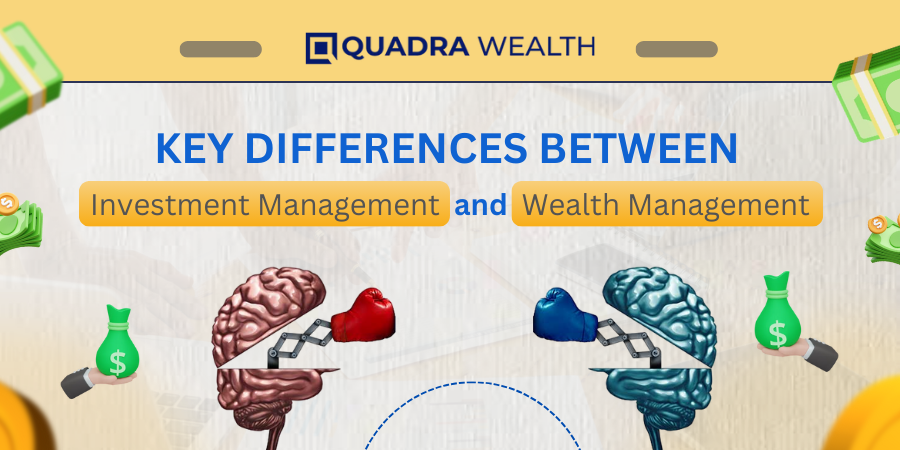It may seem insignificant to differentiate between investment management and wealth management when it comes to financial planning, but they are vital. Because they function on different levels, understanding the differences between the two can help you reach your financial objectives.
While wealth management considers every aspect of your finances, investment management focuses more on identifying and picking investments. This article will explain the differences between wealth and investment management, as well as when each is necessary.
Investment Management vs Wealth Management – An Overview
What is Investment Management
The main function of investment management is investment portfolio management. Investment management involves both a short- and long-term strategy for your portfolio holdings, in addition to the buying and selling of stocks. Investment managers take into account a range of factors in your investment portfolio when determining when and how to rebalance your holdings, usually with a simple goal of maximizing value.
To start with a properly balanced portfolio, your broker or advisor will assist you in achieving your financial goals and risk tolerance based on a client assessment.
Understand that, even in the world of investment management, not all managers are the same. Recognize that there are differences among managers even in the field of investment management. Make sure you enquire about the fiduciary standard and dual registration status of the person you are working with to make sure they prioritize your work.
You may only require an investment manager if you believe you are in control of other areas of your estate.
Goal of Investment Management
To achieve investors’ financial goals, investment manager seeks to maximize returns while controlling risks. Investment Management includes asset allocation, buying and selling securities, risk management, performance monitoring, tax efficiency, and regulation compliance.
Investment Management aims to create and manage a portfolio that supports investors’ objectives—such as capital preservation, income generation, or capital appreciation.
Read more: Difference Between Financial Planning and Wealth Management
Why Choose Investment Management?
Numerous advantages are offered by the investment to both individuals and organizations, such as experience, expertise, diversity, risk management, time management, performance management, tax compliance, and access to resources.
The impact of poor performance can be lessened by diversifying investments across asset classes, industries, and geographical areas. Moreover, professional management of risk can shield investments from large losses.
In order to give investors a clear picture of the performance of their fund, fund managers also make sure that all applicable regulations are followed and they regularly provide performance reports.
What is Wealth Management
This takes a more holistic approach to managing a person’s or family’s financial circumstances, wealth management focuses on high-net-worth individuals and families.
Wealth manager builds a comprehensive plan by taking a more comprehensive view of your estate and financial situation. In addition to growing and managing your portfolio, your financial advisor takes into account every element, such as:
- Income
- Expenses
- Insurance Requirements
- Retirement Goals
- Estate Planning
- Savings Goals for College
- Asset Management
- Tax Tactics
A wealth manager may adopt a comprehensive approach that is especially beneficial for large and complicated estate requirements. They frequently keep an eye on your accounts to make sure your plan adjusts for changes in your life or the condition of the economy. Wealth management differs significantly from investment management and basic financial advice because of its proactive and comprehensive approach.
Objective of Wealth Manager
A wealth manager’s primary objective is to efficiently increase and protect a client’s or entity’s financial assets over time.
Wealth management uses sound financial management and calculated risk-taking to maximize wealth accumulation, offer financial security, and accomplish legacy and personal goals.
Why Choose Wealth Management?
Wealth managers provide individualized investment strategies and financial planning to help you confidently accomplish your financial objectives. They manage the complexity of legacy and tax planning, guarantee effective wealth growth, and offer security.
You can make wise financial decisions and feel secure about your financial future with their experience.
Key Differences Between Investment and Wealth Management?
| Components | Investment Management | Wealth Management |
| Meaning | Resources allocation into assets for financial well-being in the future | An accumulation of valuable assets, money, and resources |
| Purpose | Grow capital and generate returns | Wealth Management services ensure stability and financial security while attending to complex financial needs. |
| Types | Commodities, stocks, bonds, real estate, and mutual funds | Investments, businesses, savings accounts, personal property, and real estate |
| Risk and Return | Varies depending on the investment type and state of the market | Generally more stable and less affected by market fluctuations. |
| Time Horizon | Short to long-term (months to decades). | Considered for a lifetime and beyond. |
| Active Management | Requires keeping an eye on and modifying tactics | Comprehensive monitoring of the overall financial situation |
| Components | Specific financial instruments | Total asset value less all liabilities |
| Stability | Vulnerable to volatility and market risks | Steadier and focused on preservation for the future |
| Management Focus | Centered on maximizing personal financial investments | Consists of retirement planning, tax planning, estate planning, and investing. |
| Longevity | Aimed at individual’s specific monetary objectives and expansion | Aimed at legacy planning and long-term financial security |
Wealth Management and Investment Management- What is Suitable for You?
The level of guidance and expertise you require will determine which management style is most appropriate for you. An investment manager might be the best choice for you if you feel comfortable handling all aspects of your estate needs on your own, including family planning, tax strategies, and insurance requirements.
If you have complex financial needs associated with larger estates or would prefer to avoid the financial and psychological strain of comprehensive planning, wealth management is the best option as it’s an aspect of financial services.
The Bottom Line
It’s critical to take these distinctions into account when choosing the strategy that will work best for you. The final decision between the two is based on the risk tolerance and financial objectives of the individual.
People should think about their comfort level with risk as well as their long-term goals when making this choice, including whether they are primarily focused on capital gains or long-term financial stability building.










